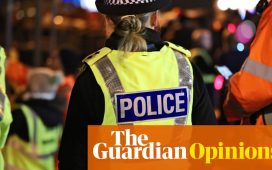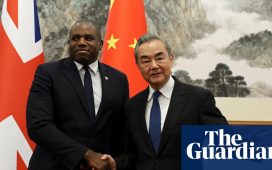Rafael Behr says that the killers of Jo Cox and David Amess “cannot be used to discredit the causes they appropriated” (There is a far bigger threat to Britain than fringe extremists, 13 March). However, Thomas Mair, Cox’s killer, shouted “Britain first” as he attacked her, and that he did this after weeks of often intimidatory nationalist rhetoric by some leave campaigners suggests that Behr’s conclusion does not always apply.
Ironically, the leave campaign, in which Michael Gove played a leading role, is probably the strongest case of a nonviolent campaign inspiring violent action – there was a wave of attacks against Europeans, Muslims, gay people and others. Not a case for banning Vote Leave, as Gove’s new plans might lead us to conclude, of course, but cause to reflect on where the inspiration for extremism has been coming from in British politics over the last decade.
Prof Martin Shaw
University of Sussex
Rafael Behr talks of the “debilitation of democratic spirit” as the government fears losing the election. As I canvass in a north-west constituency, the chilling response is that some voters no longer wish to vote at all. The cold hand of an uncaring government has finally succeeded in suppressing the democratic inclination of what I hope is a minority of voters.
This response is largely from those under 40; many of them will have only experienced this government for the whole of their adult lives. As a result, some voters presume that politicians are all the same when in fact it has just been one party that has dominated their lives. One parting shot that I heard while canvassing was from a father who was incensed that he had to appeal to a charity for an IV stand for his severely disabled child.
Alan Alexander
Whitehaven, Cumbria
So the government is considering banning MPs from engaging with organisations such as Extinction Rebellion (Report, 5 March). Would such a prohibition extend to supporters such as the former archbishop Rowan Williams, the prominent Nasa scientist Peter Kalmus, or the 30 distinguished climate scientists who voiced concerns in XR’s open letter to the Charity Commission about the spread of climate disinformation from Tufton Street thinktanks? Restricting engagement with such expertise undermines the pursuit of informed policy.
Tom Hardy
Extinction Rebellion
One organisation that could be seen as exemplifying all three of the examples in Michael Gove’s definition of extremism (UK ministers and officials to be banned from contact with groups labelled extremist, 14 March) is surely the present government as it attempts to deny international commitments, and laws based on them, regarding asylum. There is also a history of attempts to bypass parliament (by, for example, Boris Johnson) as well as denigration of the legal system. A ridiculous mess.
Fiona Mathers
Wakefield, West Yorkshire
Irony is supposed to have died after Henry Kissinger’s Nobel prize. Having looked carefully at Michael Gove’s definition of extremism, I wonder when government departments will be prohibited from engaging with the Tory party.
Jeremy Cushing
Wiveliscombe, Somerset
I had been wondering if Michael Gove’s definition of extremism would include those saying that individuals “should be shot”?
Rod Price
Mollington, Oxfordshire











